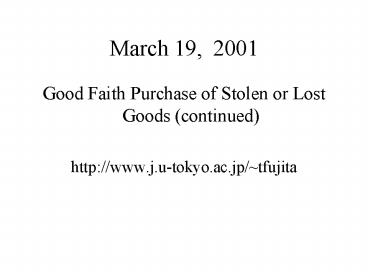March 19, 2001 - PowerPoint PPT Presentation
1 / 19
Title: March 19, 2001
1
March 19, 2001
- Good Faith Purchase of Stolen or Lost Goods
(continued) - http//www.j.u-tokyo.ac.jp/tfujita
2
- Owner Thief (Middle Person)-Buyer
- (Problem)
- How to allocate the theft risk among parties
involved ?
3
Economic Perspective (primitive version)
- Prevention
- Which party is in the better position to avoid
theft ? - Risk bearing
- Which party is in the better position to insure
the risk
4
Caveat
- Because the buyers can claim a warranty of title
to a subsequent person (U. C. C. Art. 2-312,
J.C.C. 566), it is not appropriate simply to
compare the owner and the final buyer. Compare
the owner and the buyer who purchased from a
wrongdoer (thief or criminal receivers).
5
An Additional Question
- If it is difficult to determine who is in the
better position to prevent theft categorically,
why dont we adopt case-by-case approach to
determine who is the least cost avoider in each
particular case ? - see, contributing negligence (or last clear
chance test) in tort law
6
Additional Questions (contd)
- Is it sensible to give real owner a protection if
and only if he/she has made a reasonable
precaution (e.g., investment against theft) ? - Neither the U.S. and Japan adopts such an
approach and perhaps very few in the world does.
Why ?
7
Should property law rules differ from torts?
- Unlike tort law, which takes a (remarkably)
case-by-case approach to the problem of multiple
causal agents, property law ---- perhaps
because certainty of title is regarded as more
important than is certainty of tort liability
---- looks for a general rule (as between O and
B) and only infrequently allows particular
circumstances to alter the rule. (Levmore, p.
48)
8
Risk bearing
- Owner is usually in better position to insure.
- (property insurance usually contains coverage
for theft risk while insurance for void title
is rare, if not none.) - Why insurance companies dont sell void title
coverage for the buyers especially in the U.S.
where good faith purchasers need protection ?
9
Risk bearing (contd)
- Two different implications.
- Few void title coverage imply the owner is a
better risk bearer. Thus good faith purchaser
should be protected. - Insurance companies do not want to offer void
title coverage because of the moral hazard
problem of the buyer. Any protection of good
faith purchaser would cause the same problem.
Thus good faith purchaser should not be
protected.
10
Post-theft behavior
- Original owner may often has replaced the
property after theft. - Buyer may, after all, have become quite
attached to his new goods. - ?Isnt it efficient to make the buyer keep the
goods ? Otherwise, the owner will resell the
returned goods to someone (perhaps to the buyer
himself).
11
Schwartz and Scotts Argument
- Prof. Schwartz and Scott suggest the following
analysis. - The owner is not likely to be affected by any
legal rule that allocate theft risk. Because,
- 1. The probability of recovery is law,
- 2. The owner has often replaced the goods,
- 3. Recovered goods are often not valuable to the
owner because they are used and the thief and the
others could have abused them.
12
Schwartz and Scotts Argument (continued)
- On the contrary, the purchaser from the thieve
may well be influenced by the legal rule. Because - 1. Though the probability of recovery is low,
- 2. The purchaser who surrenders the stolen goods
must replace them, and - 3. The purchaser has become familiar with the
goods and therefore wishes to avoid the risks and
costs associated with purchasing and using new
items.
13
Schwartz and Scotts Argument (continued)
- Therefore, purchasers will be more responsive
than owners to the legal rules allocating
property rights in stolen goods. - ? the U. C. C. rule of non-assignment is thus
efficient. - (Schwartz and Scott, pp.509-510.)
- Persuasive ?
14
Critical Assumption for Schwartz and Scotts
Argument
- Owner assign a negligible value to the potential
benefits of the returned goods. (low probability
and decreased value) - Purchaser values such goods more than owners.
- Are they plausible?
15
Effects on Thieves Behavior
- Protection of good faith purchaser would
arguably lead to an expansion of the market for
stolen good. - (Remember moral hazard argument)
- ?
- This gives thieves and commercial criminal
receivers an incentive to increase their
activity. - ?
- Eventually, net social loss increase.
- Persuasive ???
16
Some institutional differences
- Definition of good faith purchase
- If the definition of good faith is something
honesty in fact (U.C.C.1-201(19)), buyers
moral hazard would be very serious cf. no
negligence is required under J.C.C. Art. 192. - Is there any police regulation for used goods
market? In Japan, there is (Used Goods Dealing
Act).
17
Further Considerations
- In addition to the question whether good faith
purchaser needs protection, it should be
considered that what form of protection is
adequate. For example, more outright protection
such as market-overt-rule in the U.K. or some
intermediate solution as in Japan (or other Civil
Law Countries) ? - Is there any affirmative reason for intermediate
solution rather than outright protection?
18
Post-theft behavior (revisited)
- The retuned goods are often not valuable for
owner who may often has replaced the property
after theft. - Buyer may, after all, have become quite
attached to his new goods. - ? Requiring compensation Japanese law might
arguably be a device to screen the owner for whom
goods are still valuable.
19
Final questions
- Does the Rules on stolen goods differ because
underlying fact differs (peoples behavior or
market structure) ? - Does the rule differ because the issue is
something reasonable law maker would disagree? - Or other possibility?
























![United Kingdom Beverage March [2016] PowerPoint PPT Presentation](https://s3.amazonaws.com/images.powershow.com/8448812.th0.jpg?_=20160408061)






